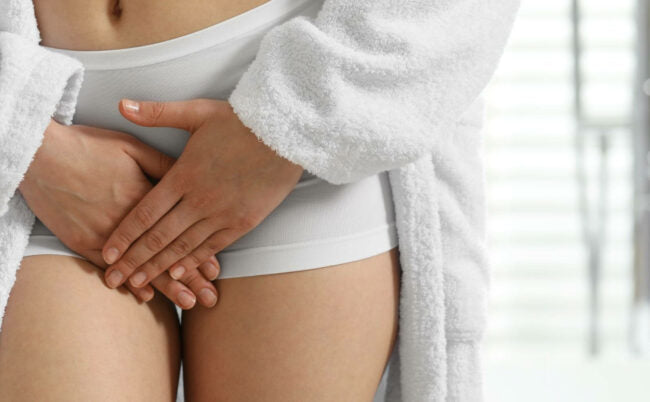Just like urinary leakage, urinary infection is a common health problem that particularly affects women. The most common form is cystitis, an inflammation of the bladder generally caused by bacterial infection. It often results in frequent urges to urinate, pain or burning sensations when urinating. Although it may be uncomfortable, it easy to care for when treated promptly.
Causes of urinary tract infections in women
Several factors can promote the development of a urinary tract infection, particularly in women. Their urethra being shorter than that of men, bacteria reach the bladder more easily.
Certain periods of life are also at greater risk, particularly the start of sex life, pregnancy and menopause, due to hormonal changes and changes in the bladder mucosa.

Other causes can also occur:
- Urinary tract abnormalities : the presence of stones (lithiasis), strictures (stenoses) of the urethra or ureters, urinary flow disorders such as enlarged prostate in men, vesicoureteral reflux in children, or even a incomplete emptying of the bladder, common in the elderly.
- The presence of foreign bodies in the bladder, such as urinary catheters or stones.
- THE medical interventions : certain manipulations such as urinary catheterization or endoscopic examinations can promote infection.
- THE sex, although this factor is more rarely involved.
- THE hygiene habits : wearing clothes that are too tight or repeated friction can create a favorable environment for infection.
- A weakened immune system, particularly in cases of severe immunosuppression.
- THE chronic diseases : diabetes is a significant risk factor due to the presence of sugar in the urine (glycosuria) and urination problems.
All of these factors can disrupt the natural balance of the urinary system and facilitate the proliferation of bacteria, responsible for the infection.

Urinary infection: the symptoms
Acute cystitis
There acute cystitis is the shape most common urinary tract infection. It manifests itself by several characteristic signs:
- A pollakiuria, that is, frequent urges to urinate, often in small quantities.
- Of the burning or pain during urination.
- Of the cloudy urine, sometimes accompanied by a strong odor.
- Absence of fever, which generally allows it to be distinguished from a higher infection, such as pyelonephritis.
Recurrent cystitis
Recurrent cystitis is defined by the occurrence of at least four episodes of acute cystitis in the year.

In this case, it is important to carry out additional examinations to look for an underlying cause or a contributing factor (anatomical anomaly, functional disorder, etc.).
Pyelonephritis
Pyelonephritis is a more serious urinary tract infection that affects the kidneys. It results from a inflammation of the renal pelvis (pyelo) and kidney tissue infection (nephritis), often caused by the spread of bacteria from the bladder to the upper urinary tract.
THE typical symptoms are :
- Of the unilateral kidney pain, located in the lower back or side, often intense.
- A high fever, usually accompanied by chills and an altered general condition.
- Sometimes, burning when urinating and urinary frequency (frequent urge to urinate) may be present, but these signs are inconsistent.
It is important to note that 30-40% of women with pyelonephritis do not have prior symptoms of cystitis, which can delay diagnosis. Due to the risk of complications, pyelonephritis requires rapid and appropriate medical care.

How to treat a urinary infection?
What to do in case of a urinary infection?
At the first signs of cystitis, it is recommended to drink lots of water. This helps to urinate frequently, which helps limit the proliferation of bacteria and prevent them from going up to the kidneys.
However, in the event of significant pain when urinating, it may be preferable to moderate fluid intake at the start of treatment until the symptoms subside thanks to the action of the antibiotic.

Rapid and appropriate support generally allows for complete recovery without complications.
Urinary infection: treatments
Take antibiotics to treat urinary infection
The treatment of urinary infections is mainly based on taking antibiotics, notably fosfomycin, often prescribed in a single dose.
This antibiotic acts quickly by concentrating in the urine, where it blocks the growth of bacteria responsible for the infection. It is particularly effective in cases of uncomplicated cystitis.

However, the prescription of an antibiotic can only be done after medical advice. It is therefore essential to consult a health professional, who will be able to make a precise diagnosis and, if necessary, carry out examinations such as urine analysis in order to identify the bacteria in question and adapt the treatment accordingly.
Urinary infection: what natural treatment?
In case of benign cystitis, certain plants may be recommended, such as diuretic plants which promote the elimination of bacteria by increasing the volume of urine, or antibacterial plants which help prevent recurrences.

However, although these herbs can relieve the symptoms of urinary tract infections, they should never replace a medical treatment.
In the event of serious symptoms such as fever, severe pain, blood in the urine or persistent symptoms, it is essential to consult a doctor.
A poorly treated UTI can lead to complications, so it is crucial not to ignore these signs and follow the recommendations from a healthcare professional.

Parsley
Thanks to its diuretic and anti-inflammatory properties, parsley is a effective plant against cystitis.
Its leaves are frequently used for relieve urinary problems and promote the proper functioning of the kidneys. Its diuretic effect helps eliminate toxins and prevent urinary infections.
Additionally, parsley is recommended to support urinary tract health and strengthen the immune system.

Cut the parsley into small pieces and add it to a cup of boiling water. Leave to infuse for 5 to 7 minutes, then filter the infusion. You can consume this drink up to 3 times a day.
The parsley infusion is contraindicated among the pregnant women and people with kidney or heart failure.
Thyme
Thyme has antiseptic, antibacterial and diuretic properties which make it a effective natural remedy for cystitis.
It helps eliminate infection-causing bacteria, while reducing inflammation in the urinary tract. Its diuretic action stimulates the elimination of toxins and bacteria, thus promoting healing and preventing recurrence.

Steep 1 to 2 teaspoons of dried thyme (or a sprig of fresh thyme) in 250 ml of boiling water for 5 to 10 minutes, then strain and drink up to 2 to 3 cups per day.
This herbal tea is not recommended for people suffering from hypertension or cardiovascular problems, pregnant women (because of its potential to cause hormonal imbalances) as well as children.
Ginger
Ginger, thanks to its anti-inflammatory, antibacterial and antioxidant properties, is particularly useful in case of urinary infection.
It helps to reduce inflammation and support the immune system, thus promoting the fight against the bacteria responsible for the infection.
In addition, he can relieve pain and discomfort associated with urinary problems, while improving blood circulation, which helps eliminate toxins.

Place 2 to 3 cm of grated fresh ginger in 200 ml of water and bring to the boil for 8 to 10 minutes. Remove from the heat, cover the pan and let cool. Once lukewarm, strain the mixture and drink. It is recommended to consume up to 3 cups of this tea per day.
Ginger is contraindicated children under 6 years old, people suffering from gallstones, gastric ulcers, changes in blood circulation or following anticoagulant treatment.
Green anise
Green anise, rich in anethole, a compound with antimicrobial and anti-inflammatory properties, can be beneficial in case of urinary infection. It promotes the elimination of toxins thanks to its moderate diuretic effects, while soothing urinary tract irritation.
Anethole also helps fight infection-causing bacteria, making green anise a good supplement for support urinary tract health.

Add 1 to 2 teaspoons of anise seeds in 200 ml of boiling water, leave steep for 5 to 10 minutes, then strain and drink.
Green anise infusion is not recommended for pregnant women, people with a history of hormonal disorders, children, as well as people allergic to plants of the Apiaceae family.
How long does a urinary tract infection last without treatment?
The duration of an untreated UTI depends on several factors, such as type of infection and its severity. Cystitis, common in women, can last from a few days to several weeks without treatment.
In some cases, the infection can be asymptomatic, go unnoticed and resolve spontaneously, especially in healthy people.
However, even without symptoms, a urinary infection can progress and cause complications, especially if it goes up towards the kidneys.
This is why it is important to remain alert to signs, even slight ones, and to consult a healthcare professional if in doubt.

How to prevent urinary infections?
For prevent urinary infections, it is important to adopt a few simple but effective habits:
- Drink enough water, ideally 1.5 L per day or more, to maintain good hydration and promote regular elimination of bacteria.
- Born not holding urine and urinate as soon as the urge arises, to eliminate bacteria before they accumulate.
- Ensure a good regulation of intestinal transit to avoid constipation, which can encourage the proliferation of bacteria.
- Dry off from front to back after going to the toilet, especially in women, to avoid contamination of the urethra by bacteria from the anal region.
These simple measures help reduce the risk of recurrent urinary infections but also to take care of your intimate health. They are also beneficial in combating other disorders frequently encountered by women as urinary incontinence.







